MNG03236 Business Professional Development Report: Self-Assessment
VerifiedAdded on 2023/03/30
|12
|2853
|471
Report
AI Summary
This report delves into the multifaceted realm of business professional development, commencing with an executive summary that encapsulates the core themes explored. The introduction sets the stage by emphasizing self-awareness as a fundamental element of personal and professional growth. The discussion section meticulously examines key facets of organizational behavior, including personality traits, values, motivators, emotional intelligence, leadership styles, and power dynamics, all within the context of the author's chosen career path. The analysis extends to decision-making and planning, offering insights into the practical application of these concepts. The report culminates in a conclusion that synthesizes the findings and underscores the importance of self-management strategies for career advancement. The report is designed to be a practical exercise that highlights the personal benefits and a real-life self-management strategy that will be helping the author in obtaining a suitable position in their chosen field and developing their professional career.
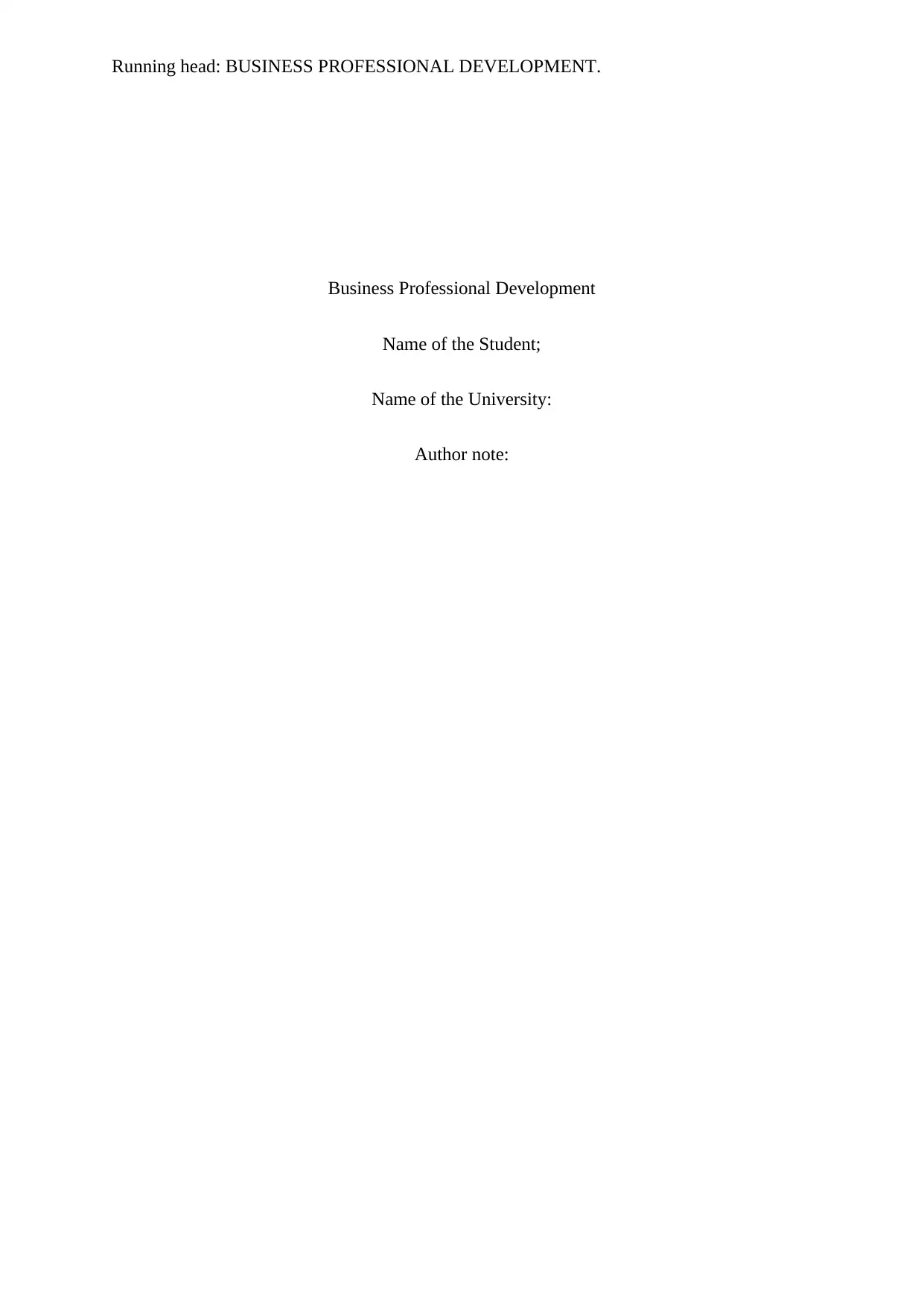
Running head: BUSINESS PROFESSIONAL DEVELOPMENT.
Business Professional Development
Name of the Student;
Name of the University:
Author note:
Business Professional Development
Name of the Student;
Name of the University:
Author note:
Paraphrase This Document
Need a fresh take? Get an instant paraphrase of this document with our AI Paraphraser
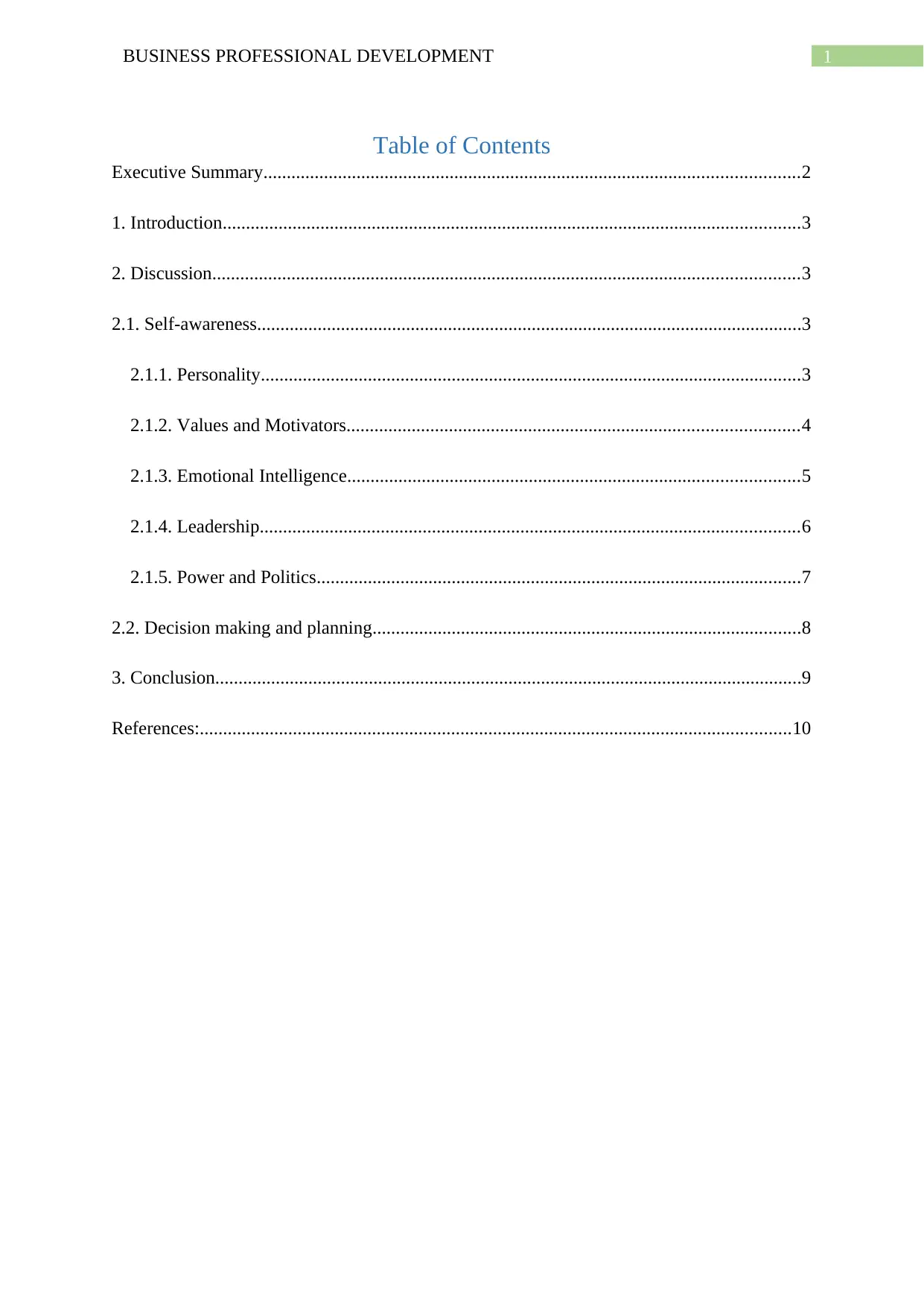
1BUSINESS PROFESSIONAL DEVELOPMENT
Table of Contents
Executive Summary...................................................................................................................2
1. Introduction............................................................................................................................3
2. Discussion..............................................................................................................................3
2.1. Self-awareness.....................................................................................................................3
2.1.1. Personality....................................................................................................................3
2.1.2. Values and Motivators.................................................................................................4
2.1.3. Emotional Intelligence.................................................................................................5
2.1.4. Leadership....................................................................................................................6
2.1.5. Power and Politics........................................................................................................7
2.2. Decision making and planning............................................................................................8
3. Conclusion..............................................................................................................................9
References:...............................................................................................................................10
Table of Contents
Executive Summary...................................................................................................................2
1. Introduction............................................................................................................................3
2. Discussion..............................................................................................................................3
2.1. Self-awareness.....................................................................................................................3
2.1.1. Personality....................................................................................................................3
2.1.2. Values and Motivators.................................................................................................4
2.1.3. Emotional Intelligence.................................................................................................5
2.1.4. Leadership....................................................................................................................6
2.1.5. Power and Politics........................................................................................................7
2.2. Decision making and planning............................................................................................8
3. Conclusion..............................................................................................................................9
References:...............................................................................................................................10
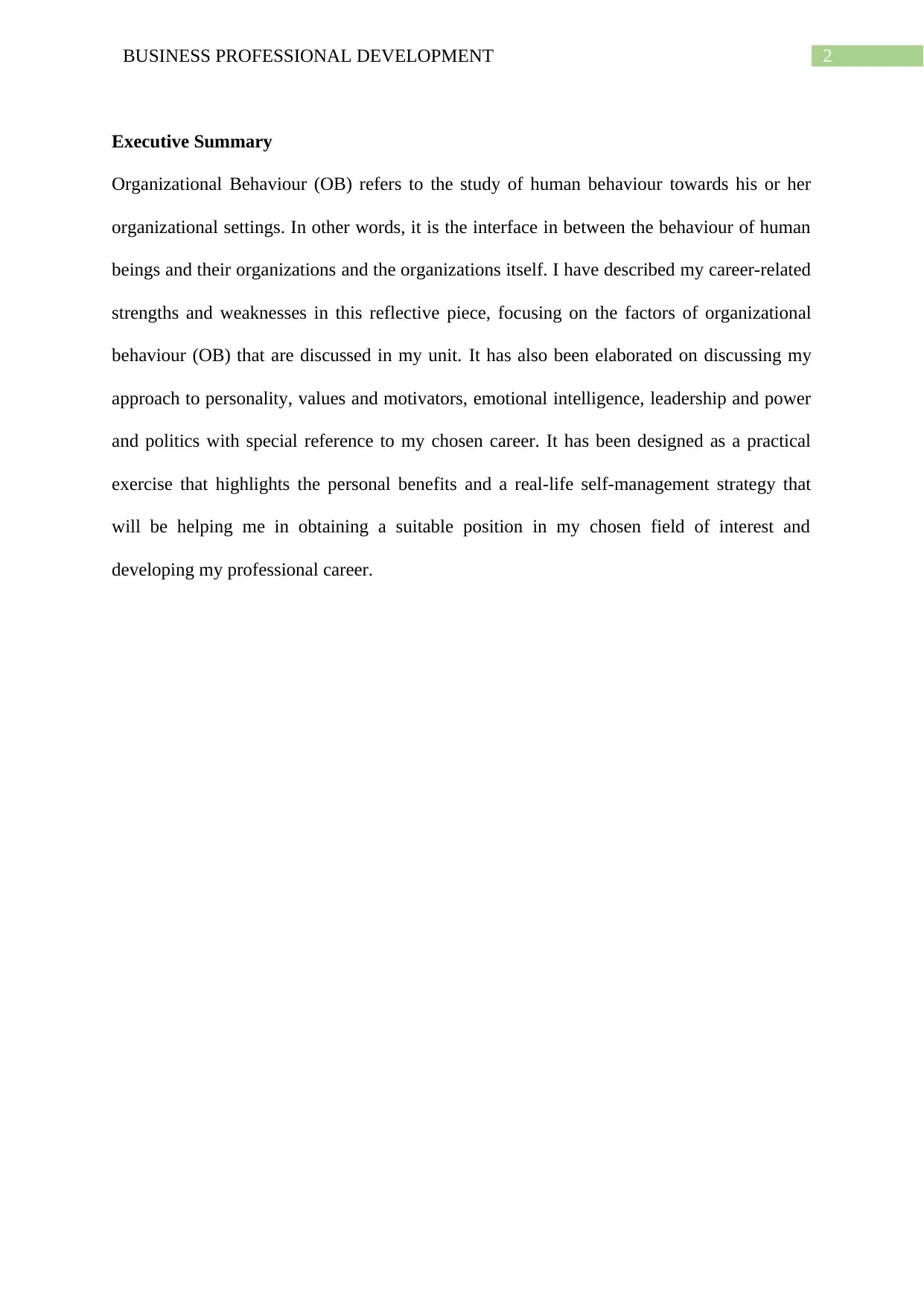
2BUSINESS PROFESSIONAL DEVELOPMENT
Executive Summary
Organizational Behaviour (OB) refers to the study of human behaviour towards his or her
organizational settings. In other words, it is the interface in between the behaviour of human
beings and their organizations and the organizations itself. I have described my career-related
strengths and weaknesses in this reflective piece, focusing on the factors of organizational
behaviour (OB) that are discussed in my unit. It has also been elaborated on discussing my
approach to personality, values and motivators, emotional intelligence, leadership and power
and politics with special reference to my chosen career. It has been designed as a practical
exercise that highlights the personal benefits and a real-life self-management strategy that
will be helping me in obtaining a suitable position in my chosen field of interest and
developing my professional career.
Executive Summary
Organizational Behaviour (OB) refers to the study of human behaviour towards his or her
organizational settings. In other words, it is the interface in between the behaviour of human
beings and their organizations and the organizations itself. I have described my career-related
strengths and weaknesses in this reflective piece, focusing on the factors of organizational
behaviour (OB) that are discussed in my unit. It has also been elaborated on discussing my
approach to personality, values and motivators, emotional intelligence, leadership and power
and politics with special reference to my chosen career. It has been designed as a practical
exercise that highlights the personal benefits and a real-life self-management strategy that
will be helping me in obtaining a suitable position in my chosen field of interest and
developing my professional career.
⊘ This is a preview!⊘
Do you want full access?
Subscribe today to unlock all pages.

Trusted by 1+ million students worldwide
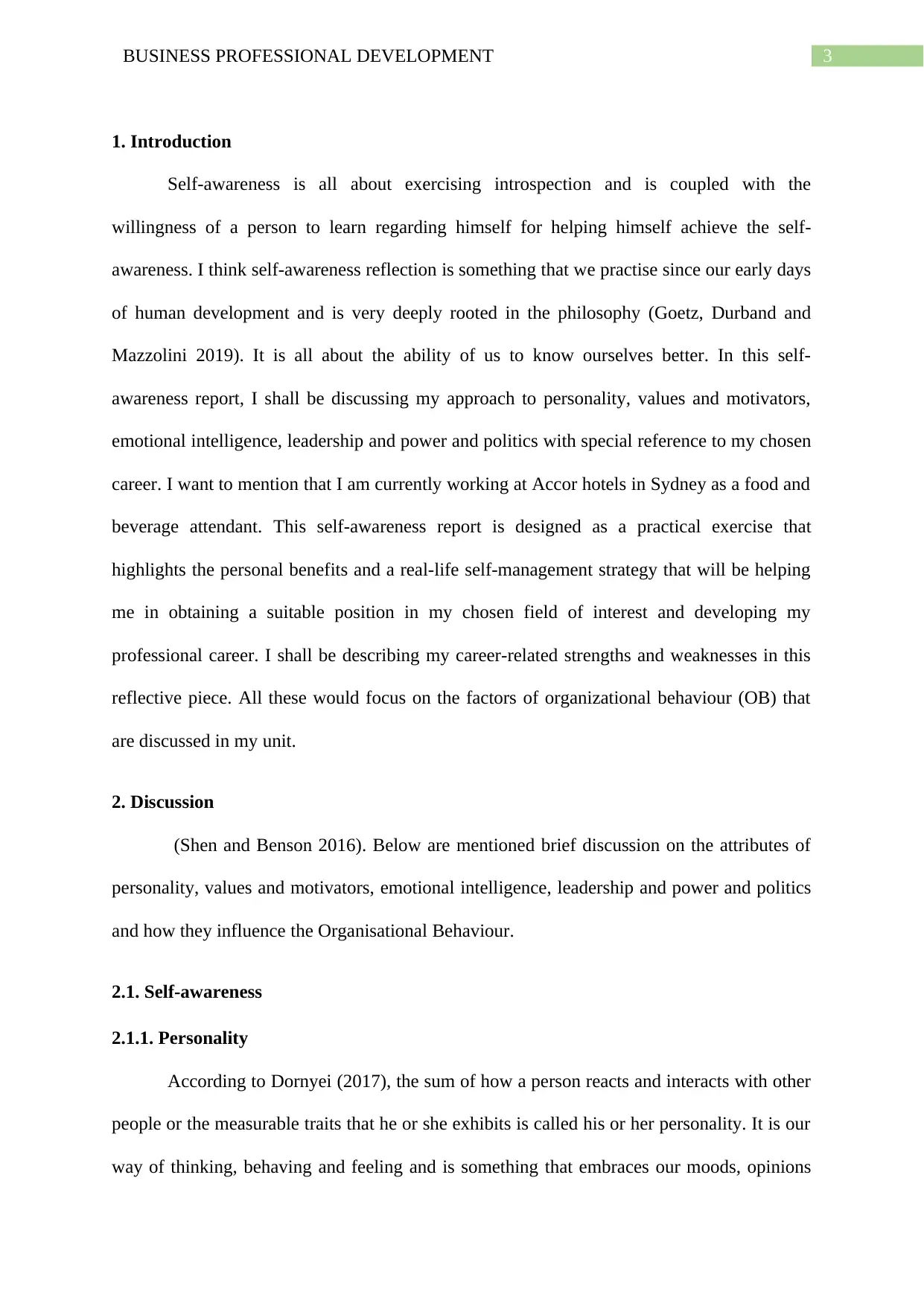
3BUSINESS PROFESSIONAL DEVELOPMENT
1. Introduction
Self-awareness is all about exercising introspection and is coupled with the
willingness of a person to learn regarding himself for helping himself achieve the self-
awareness. I think self-awareness reflection is something that we practise since our early days
of human development and is very deeply rooted in the philosophy (Goetz, Durband and
Mazzolini 2019). It is all about the ability of us to know ourselves better. In this self-
awareness report, I shall be discussing my approach to personality, values and motivators,
emotional intelligence, leadership and power and politics with special reference to my chosen
career. I want to mention that I am currently working at Accor hotels in Sydney as a food and
beverage attendant. This self-awareness report is designed as a practical exercise that
highlights the personal benefits and a real-life self-management strategy that will be helping
me in obtaining a suitable position in my chosen field of interest and developing my
professional career. I shall be describing my career-related strengths and weaknesses in this
reflective piece. All these would focus on the factors of organizational behaviour (OB) that
are discussed in my unit.
2. Discussion
(Shen and Benson 2016). Below are mentioned brief discussion on the attributes of
personality, values and motivators, emotional intelligence, leadership and power and politics
and how they influence the Organisational Behaviour.
2.1. Self-awareness
2.1.1. Personality
According to Dornyei (2017), the sum of how a person reacts and interacts with other
people or the measurable traits that he or she exhibits is called his or her personality. It is our
way of thinking, behaving and feeling and is something that embraces our moods, opinions
1. Introduction
Self-awareness is all about exercising introspection and is coupled with the
willingness of a person to learn regarding himself for helping himself achieve the self-
awareness. I think self-awareness reflection is something that we practise since our early days
of human development and is very deeply rooted in the philosophy (Goetz, Durband and
Mazzolini 2019). It is all about the ability of us to know ourselves better. In this self-
awareness report, I shall be discussing my approach to personality, values and motivators,
emotional intelligence, leadership and power and politics with special reference to my chosen
career. I want to mention that I am currently working at Accor hotels in Sydney as a food and
beverage attendant. This self-awareness report is designed as a practical exercise that
highlights the personal benefits and a real-life self-management strategy that will be helping
me in obtaining a suitable position in my chosen field of interest and developing my
professional career. I shall be describing my career-related strengths and weaknesses in this
reflective piece. All these would focus on the factors of organizational behaviour (OB) that
are discussed in my unit.
2. Discussion
(Shen and Benson 2016). Below are mentioned brief discussion on the attributes of
personality, values and motivators, emotional intelligence, leadership and power and politics
and how they influence the Organisational Behaviour.
2.1. Self-awareness
2.1.1. Personality
According to Dornyei (2017), the sum of how a person reacts and interacts with other
people or the measurable traits that he or she exhibits is called his or her personality. It is our
way of thinking, behaving and feeling and is something that embraces our moods, opinions
Paraphrase This Document
Need a fresh take? Get an instant paraphrase of this document with our AI Paraphraser
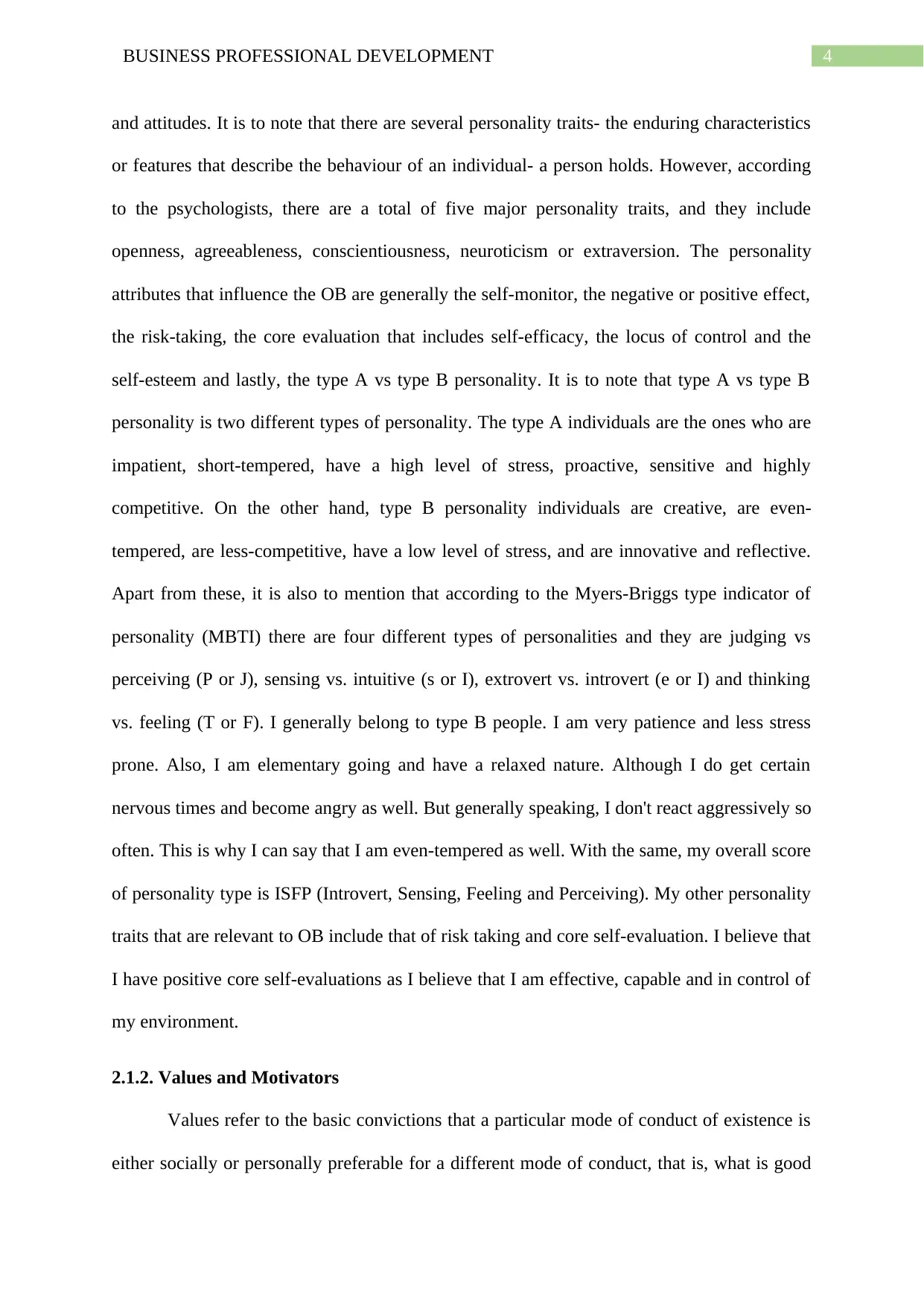
4BUSINESS PROFESSIONAL DEVELOPMENT
and attitudes. It is to note that there are several personality traits- the enduring characteristics
or features that describe the behaviour of an individual- a person holds. However, according
to the psychologists, there are a total of five major personality traits, and they include
openness, agreeableness, conscientiousness, neuroticism or extraversion. The personality
attributes that influence the OB are generally the self-monitor, the negative or positive effect,
the risk-taking, the core evaluation that includes self-efficacy, the locus of control and the
self-esteem and lastly, the type A vs type B personality. It is to note that type A vs type B
personality is two different types of personality. The type A individuals are the ones who are
impatient, short-tempered, have a high level of stress, proactive, sensitive and highly
competitive. On the other hand, type B personality individuals are creative, are even-
tempered, are less-competitive, have a low level of stress, and are innovative and reflective.
Apart from these, it is also to mention that according to the Myers-Briggs type indicator of
personality (MBTI) there are four different types of personalities and they are judging vs
perceiving (P or J), sensing vs. intuitive (s or I), extrovert vs. introvert (e or I) and thinking
vs. feeling (T or F). I generally belong to type B people. I am very patience and less stress
prone. Also, I am elementary going and have a relaxed nature. Although I do get certain
nervous times and become angry as well. But generally speaking, I don't react aggressively so
often. This is why I can say that I am even-tempered as well. With the same, my overall score
of personality type is ISFP (Introvert, Sensing, Feeling and Perceiving). My other personality
traits that are relevant to OB include that of risk taking and core self-evaluation. I believe that
I have positive core self-evaluations as I believe that I am effective, capable and in control of
my environment.
2.1.2. Values and Motivators
Values refer to the basic convictions that a particular mode of conduct of existence is
either socially or personally preferable for a different mode of conduct, that is, what is good
and attitudes. It is to note that there are several personality traits- the enduring characteristics
or features that describe the behaviour of an individual- a person holds. However, according
to the psychologists, there are a total of five major personality traits, and they include
openness, agreeableness, conscientiousness, neuroticism or extraversion. The personality
attributes that influence the OB are generally the self-monitor, the negative or positive effect,
the risk-taking, the core evaluation that includes self-efficacy, the locus of control and the
self-esteem and lastly, the type A vs type B personality. It is to note that type A vs type B
personality is two different types of personality. The type A individuals are the ones who are
impatient, short-tempered, have a high level of stress, proactive, sensitive and highly
competitive. On the other hand, type B personality individuals are creative, are even-
tempered, are less-competitive, have a low level of stress, and are innovative and reflective.
Apart from these, it is also to mention that according to the Myers-Briggs type indicator of
personality (MBTI) there are four different types of personalities and they are judging vs
perceiving (P or J), sensing vs. intuitive (s or I), extrovert vs. introvert (e or I) and thinking
vs. feeling (T or F). I generally belong to type B people. I am very patience and less stress
prone. Also, I am elementary going and have a relaxed nature. Although I do get certain
nervous times and become angry as well. But generally speaking, I don't react aggressively so
often. This is why I can say that I am even-tempered as well. With the same, my overall score
of personality type is ISFP (Introvert, Sensing, Feeling and Perceiving). My other personality
traits that are relevant to OB include that of risk taking and core self-evaluation. I believe that
I have positive core self-evaluations as I believe that I am effective, capable and in control of
my environment.
2.1.2. Values and Motivators
Values refer to the basic convictions that a particular mode of conduct of existence is
either socially or personally preferable for a different mode of conduct, that is, what is good
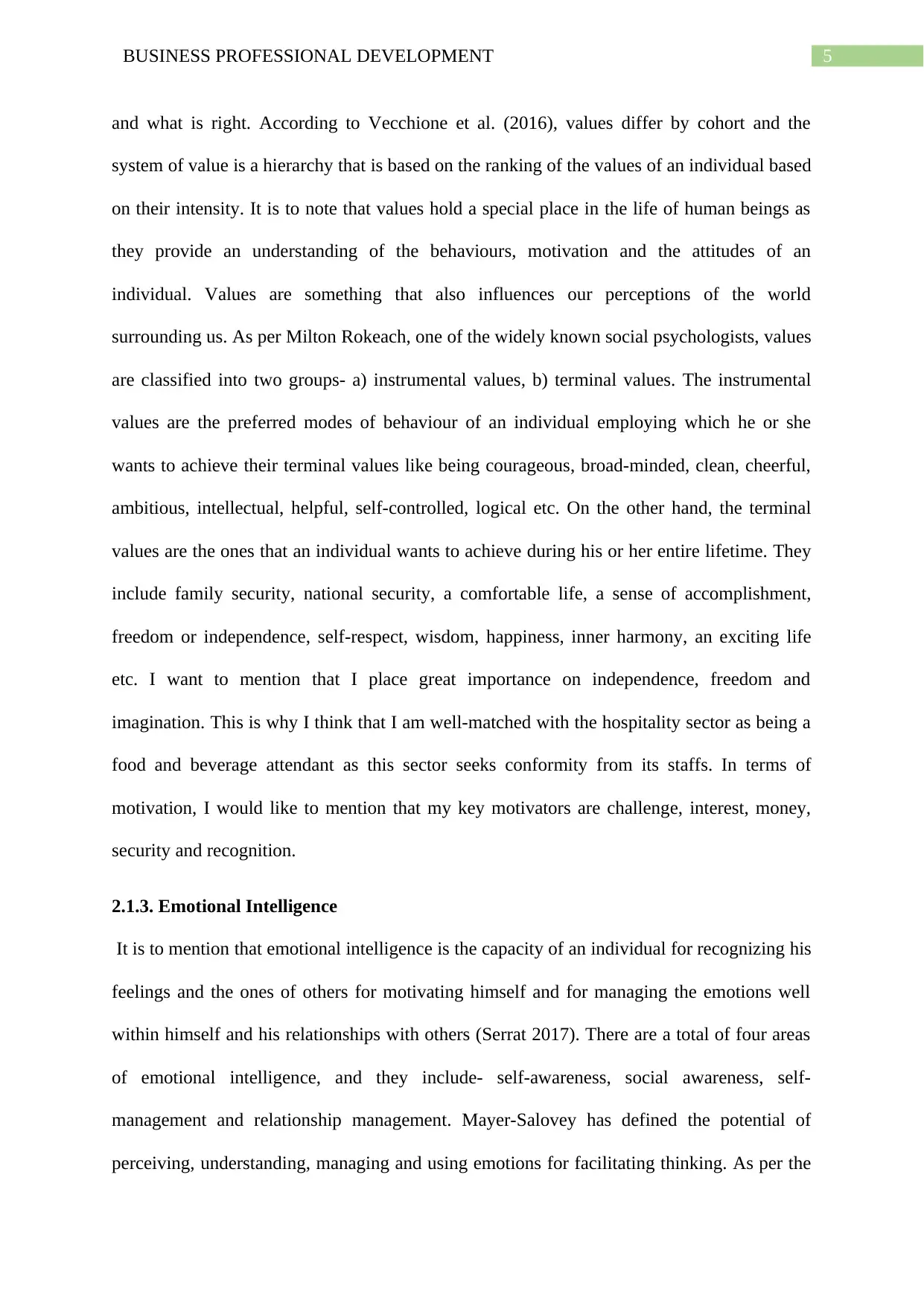
5BUSINESS PROFESSIONAL DEVELOPMENT
and what is right. According to Vecchione et al. (2016), values differ by cohort and the
system of value is a hierarchy that is based on the ranking of the values of an individual based
on their intensity. It is to note that values hold a special place in the life of human beings as
they provide an understanding of the behaviours, motivation and the attitudes of an
individual. Values are something that also influences our perceptions of the world
surrounding us. As per Milton Rokeach, one of the widely known social psychologists, values
are classified into two groups- a) instrumental values, b) terminal values. The instrumental
values are the preferred modes of behaviour of an individual employing which he or she
wants to achieve their terminal values like being courageous, broad-minded, clean, cheerful,
ambitious, intellectual, helpful, self-controlled, logical etc. On the other hand, the terminal
values are the ones that an individual wants to achieve during his or her entire lifetime. They
include family security, national security, a comfortable life, a sense of accomplishment,
freedom or independence, self-respect, wisdom, happiness, inner harmony, an exciting life
etc. I want to mention that I place great importance on independence, freedom and
imagination. This is why I think that I am well-matched with the hospitality sector as being a
food and beverage attendant as this sector seeks conformity from its staffs. In terms of
motivation, I would like to mention that my key motivators are challenge, interest, money,
security and recognition.
2.1.3. Emotional Intelligence
It is to mention that emotional intelligence is the capacity of an individual for recognizing his
feelings and the ones of others for motivating himself and for managing the emotions well
within himself and his relationships with others (Serrat 2017). There are a total of four areas
of emotional intelligence, and they include- self-awareness, social awareness, self-
management and relationship management. Mayer-Salovey has defined the potential of
perceiving, understanding, managing and using emotions for facilitating thinking. As per the
and what is right. According to Vecchione et al. (2016), values differ by cohort and the
system of value is a hierarchy that is based on the ranking of the values of an individual based
on their intensity. It is to note that values hold a special place in the life of human beings as
they provide an understanding of the behaviours, motivation and the attitudes of an
individual. Values are something that also influences our perceptions of the world
surrounding us. As per Milton Rokeach, one of the widely known social psychologists, values
are classified into two groups- a) instrumental values, b) terminal values. The instrumental
values are the preferred modes of behaviour of an individual employing which he or she
wants to achieve their terminal values like being courageous, broad-minded, clean, cheerful,
ambitious, intellectual, helpful, self-controlled, logical etc. On the other hand, the terminal
values are the ones that an individual wants to achieve during his or her entire lifetime. They
include family security, national security, a comfortable life, a sense of accomplishment,
freedom or independence, self-respect, wisdom, happiness, inner harmony, an exciting life
etc. I want to mention that I place great importance on independence, freedom and
imagination. This is why I think that I am well-matched with the hospitality sector as being a
food and beverage attendant as this sector seeks conformity from its staffs. In terms of
motivation, I would like to mention that my key motivators are challenge, interest, money,
security and recognition.
2.1.3. Emotional Intelligence
It is to mention that emotional intelligence is the capacity of an individual for recognizing his
feelings and the ones of others for motivating himself and for managing the emotions well
within himself and his relationships with others (Serrat 2017). There are a total of four areas
of emotional intelligence, and they include- self-awareness, social awareness, self-
management and relationship management. Mayer-Salovey has defined the potential of
perceiving, understanding, managing and using emotions for facilitating thinking. As per the
⊘ This is a preview!⊘
Do you want full access?
Subscribe today to unlock all pages.

Trusted by 1+ million students worldwide
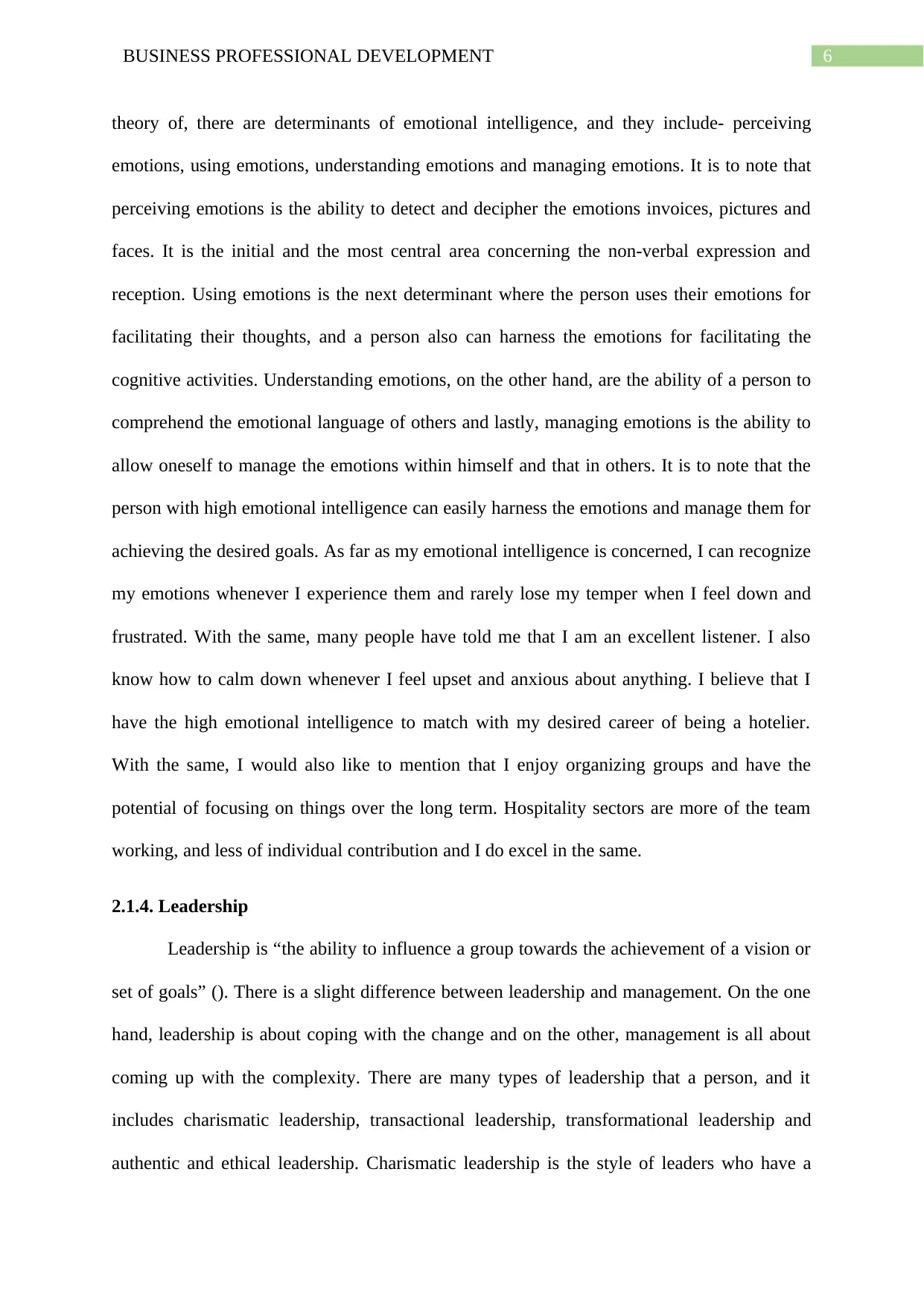
6BUSINESS PROFESSIONAL DEVELOPMENT
theory of, there are determinants of emotional intelligence, and they include- perceiving
emotions, using emotions, understanding emotions and managing emotions. It is to note that
perceiving emotions is the ability to detect and decipher the emotions invoices, pictures and
faces. It is the initial and the most central area concerning the non-verbal expression and
reception. Using emotions is the next determinant where the person uses their emotions for
facilitating their thoughts, and a person also can harness the emotions for facilitating the
cognitive activities. Understanding emotions, on the other hand, are the ability of a person to
comprehend the emotional language of others and lastly, managing emotions is the ability to
allow oneself to manage the emotions within himself and that in others. It is to note that the
person with high emotional intelligence can easily harness the emotions and manage them for
achieving the desired goals. As far as my emotional intelligence is concerned, I can recognize
my emotions whenever I experience them and rarely lose my temper when I feel down and
frustrated. With the same, many people have told me that I am an excellent listener. I also
know how to calm down whenever I feel upset and anxious about anything. I believe that I
have the high emotional intelligence to match with my desired career of being a hotelier.
With the same, I would also like to mention that I enjoy organizing groups and have the
potential of focusing on things over the long term. Hospitality sectors are more of the team
working, and less of individual contribution and I do excel in the same.
2.1.4. Leadership
Leadership is “the ability to influence a group towards the achievement of a vision or
set of goals” (). There is a slight difference between leadership and management. On the one
hand, leadership is about coping with the change and on the other, management is all about
coming up with the complexity. There are many types of leadership that a person, and it
includes charismatic leadership, transactional leadership, transformational leadership and
authentic and ethical leadership. Charismatic leadership is the style of leaders who have a
theory of, there are determinants of emotional intelligence, and they include- perceiving
emotions, using emotions, understanding emotions and managing emotions. It is to note that
perceiving emotions is the ability to detect and decipher the emotions invoices, pictures and
faces. It is the initial and the most central area concerning the non-verbal expression and
reception. Using emotions is the next determinant where the person uses their emotions for
facilitating their thoughts, and a person also can harness the emotions for facilitating the
cognitive activities. Understanding emotions, on the other hand, are the ability of a person to
comprehend the emotional language of others and lastly, managing emotions is the ability to
allow oneself to manage the emotions within himself and that in others. It is to note that the
person with high emotional intelligence can easily harness the emotions and manage them for
achieving the desired goals. As far as my emotional intelligence is concerned, I can recognize
my emotions whenever I experience them and rarely lose my temper when I feel down and
frustrated. With the same, many people have told me that I am an excellent listener. I also
know how to calm down whenever I feel upset and anxious about anything. I believe that I
have the high emotional intelligence to match with my desired career of being a hotelier.
With the same, I would also like to mention that I enjoy organizing groups and have the
potential of focusing on things over the long term. Hospitality sectors are more of the team
working, and less of individual contribution and I do excel in the same.
2.1.4. Leadership
Leadership is “the ability to influence a group towards the achievement of a vision or
set of goals” (). There is a slight difference between leadership and management. On the one
hand, leadership is about coping with the change and on the other, management is all about
coming up with the complexity. There are many types of leadership that a person, and it
includes charismatic leadership, transactional leadership, transformational leadership and
authentic and ethical leadership. Charismatic leadership is the style of leaders who have a
Paraphrase This Document
Need a fresh take? Get an instant paraphrase of this document with our AI Paraphraser
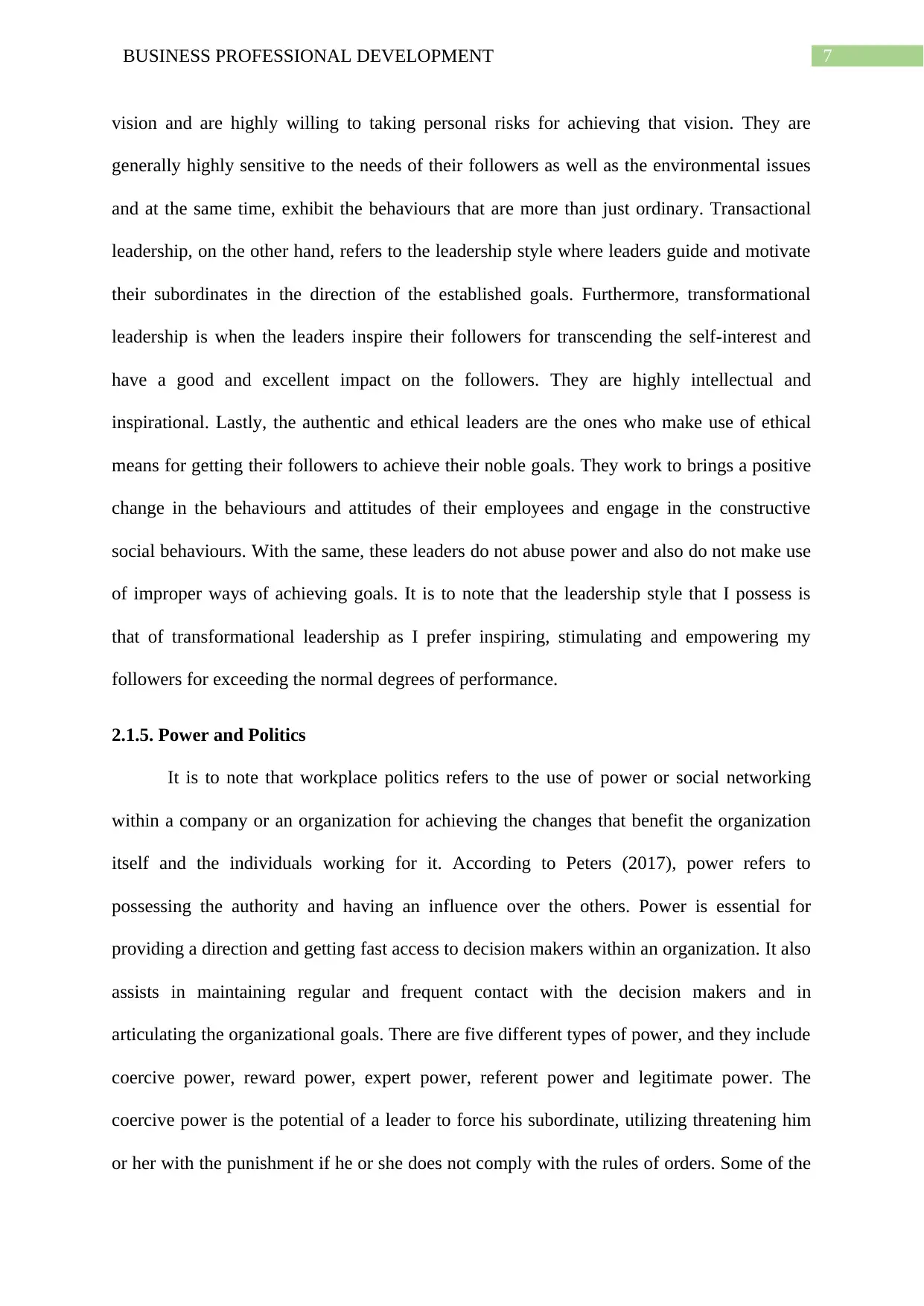
7BUSINESS PROFESSIONAL DEVELOPMENT
vision and are highly willing to taking personal risks for achieving that vision. They are
generally highly sensitive to the needs of their followers as well as the environmental issues
and at the same time, exhibit the behaviours that are more than just ordinary. Transactional
leadership, on the other hand, refers to the leadership style where leaders guide and motivate
their subordinates in the direction of the established goals. Furthermore, transformational
leadership is when the leaders inspire their followers for transcending the self-interest and
have a good and excellent impact on the followers. They are highly intellectual and
inspirational. Lastly, the authentic and ethical leaders are the ones who make use of ethical
means for getting their followers to achieve their noble goals. They work to brings a positive
change in the behaviours and attitudes of their employees and engage in the constructive
social behaviours. With the same, these leaders do not abuse power and also do not make use
of improper ways of achieving goals. It is to note that the leadership style that I possess is
that of transformational leadership as I prefer inspiring, stimulating and empowering my
followers for exceeding the normal degrees of performance.
2.1.5. Power and Politics
It is to note that workplace politics refers to the use of power or social networking
within a company or an organization for achieving the changes that benefit the organization
itself and the individuals working for it. According to Peters (2017), power refers to
possessing the authority and having an influence over the others. Power is essential for
providing a direction and getting fast access to decision makers within an organization. It also
assists in maintaining regular and frequent contact with the decision makers and in
articulating the organizational goals. There are five different types of power, and they include
coercive power, reward power, expert power, referent power and legitimate power. The
coercive power is the potential of a leader to force his subordinate, utilizing threatening him
or her with the punishment if he or she does not comply with the rules of orders. Some of the
vision and are highly willing to taking personal risks for achieving that vision. They are
generally highly sensitive to the needs of their followers as well as the environmental issues
and at the same time, exhibit the behaviours that are more than just ordinary. Transactional
leadership, on the other hand, refers to the leadership style where leaders guide and motivate
their subordinates in the direction of the established goals. Furthermore, transformational
leadership is when the leaders inspire their followers for transcending the self-interest and
have a good and excellent impact on the followers. They are highly intellectual and
inspirational. Lastly, the authentic and ethical leaders are the ones who make use of ethical
means for getting their followers to achieve their noble goals. They work to brings a positive
change in the behaviours and attitudes of their employees and engage in the constructive
social behaviours. With the same, these leaders do not abuse power and also do not make use
of improper ways of achieving goals. It is to note that the leadership style that I possess is
that of transformational leadership as I prefer inspiring, stimulating and empowering my
followers for exceeding the normal degrees of performance.
2.1.5. Power and Politics
It is to note that workplace politics refers to the use of power or social networking
within a company or an organization for achieving the changes that benefit the organization
itself and the individuals working for it. According to Peters (2017), power refers to
possessing the authority and having an influence over the others. Power is essential for
providing a direction and getting fast access to decision makers within an organization. It also
assists in maintaining regular and frequent contact with the decision makers and in
articulating the organizational goals. There are five different types of power, and they include
coercive power, reward power, expert power, referent power and legitimate power. The
coercive power is the potential of a leader to force his subordinate, utilizing threatening him
or her with the punishment if he or she does not comply with the rules of orders. Some of the
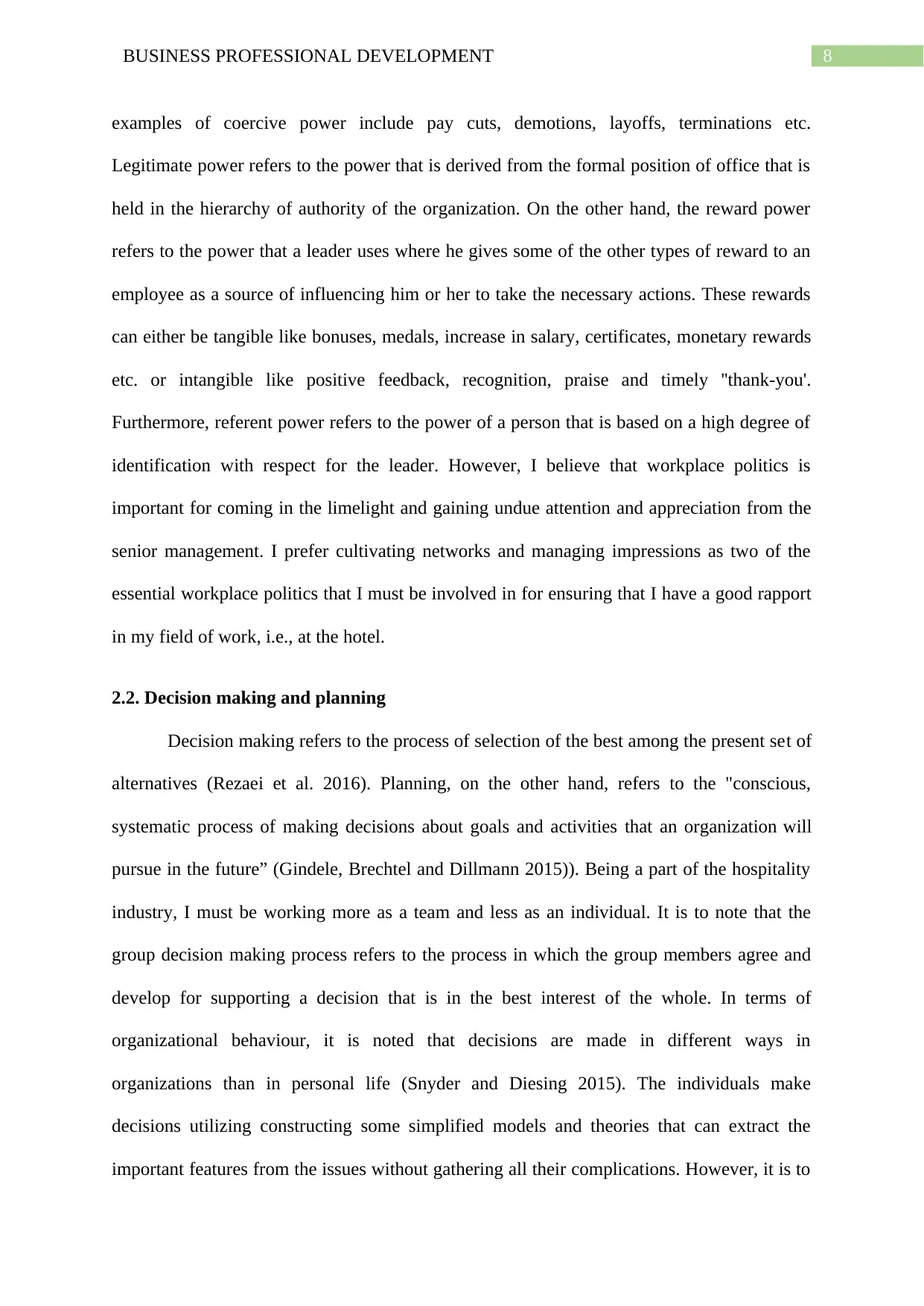
8BUSINESS PROFESSIONAL DEVELOPMENT
examples of coercive power include pay cuts, demotions, layoffs, terminations etc.
Legitimate power refers to the power that is derived from the formal position of office that is
held in the hierarchy of authority of the organization. On the other hand, the reward power
refers to the power that a leader uses where he gives some of the other types of reward to an
employee as a source of influencing him or her to take the necessary actions. These rewards
can either be tangible like bonuses, medals, increase in salary, certificates, monetary rewards
etc. or intangible like positive feedback, recognition, praise and timely ''thank-you'.
Furthermore, referent power refers to the power of a person that is based on a high degree of
identification with respect for the leader. However, I believe that workplace politics is
important for coming in the limelight and gaining undue attention and appreciation from the
senior management. I prefer cultivating networks and managing impressions as two of the
essential workplace politics that I must be involved in for ensuring that I have a good rapport
in my field of work, i.e., at the hotel.
2.2. Decision making and planning
Decision making refers to the process of selection of the best among the present set of
alternatives (Rezaei et al. 2016). Planning, on the other hand, refers to the "conscious,
systematic process of making decisions about goals and activities that an organization will
pursue in the future” (Gindele, Brechtel and Dillmann 2015)). Being a part of the hospitality
industry, I must be working more as a team and less as an individual. It is to note that the
group decision making process refers to the process in which the group members agree and
develop for supporting a decision that is in the best interest of the whole. In terms of
organizational behaviour, it is noted that decisions are made in different ways in
organizations than in personal life (Snyder and Diesing 2015). The individuals make
decisions utilizing constructing some simplified models and theories that can extract the
important features from the issues without gathering all their complications. However, it is to
examples of coercive power include pay cuts, demotions, layoffs, terminations etc.
Legitimate power refers to the power that is derived from the formal position of office that is
held in the hierarchy of authority of the organization. On the other hand, the reward power
refers to the power that a leader uses where he gives some of the other types of reward to an
employee as a source of influencing him or her to take the necessary actions. These rewards
can either be tangible like bonuses, medals, increase in salary, certificates, monetary rewards
etc. or intangible like positive feedback, recognition, praise and timely ''thank-you'.
Furthermore, referent power refers to the power of a person that is based on a high degree of
identification with respect for the leader. However, I believe that workplace politics is
important for coming in the limelight and gaining undue attention and appreciation from the
senior management. I prefer cultivating networks and managing impressions as two of the
essential workplace politics that I must be involved in for ensuring that I have a good rapport
in my field of work, i.e., at the hotel.
2.2. Decision making and planning
Decision making refers to the process of selection of the best among the present set of
alternatives (Rezaei et al. 2016). Planning, on the other hand, refers to the "conscious,
systematic process of making decisions about goals and activities that an organization will
pursue in the future” (Gindele, Brechtel and Dillmann 2015)). Being a part of the hospitality
industry, I must be working more as a team and less as an individual. It is to note that the
group decision making process refers to the process in which the group members agree and
develop for supporting a decision that is in the best interest of the whole. In terms of
organizational behaviour, it is noted that decisions are made in different ways in
organizations than in personal life (Snyder and Diesing 2015). The individuals make
decisions utilizing constructing some simplified models and theories that can extract the
important features from the issues without gathering all their complications. However, it is to
⊘ This is a preview!⊘
Do you want full access?
Subscribe today to unlock all pages.

Trusted by 1+ million students worldwide
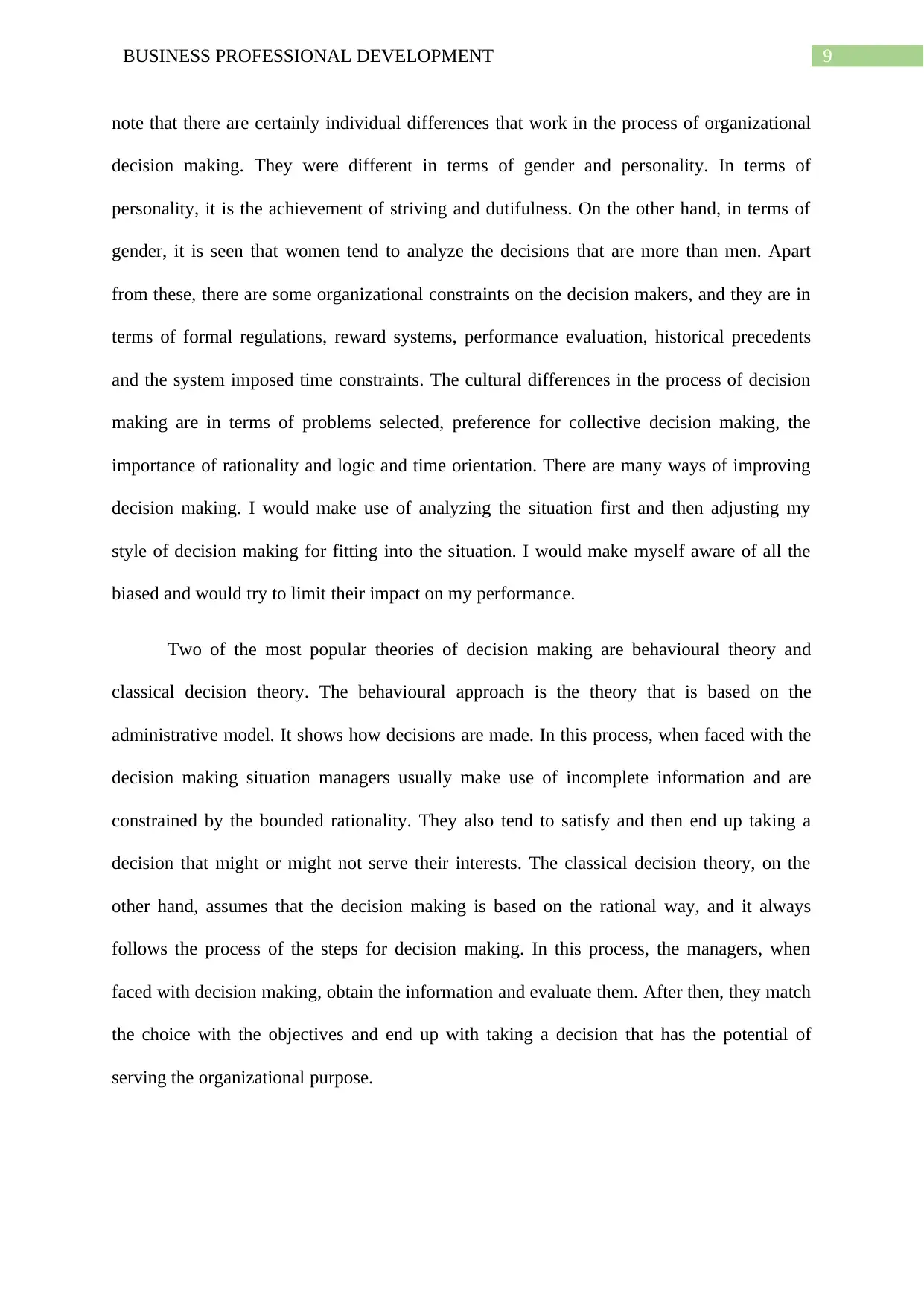
9BUSINESS PROFESSIONAL DEVELOPMENT
note that there are certainly individual differences that work in the process of organizational
decision making. They were different in terms of gender and personality. In terms of
personality, it is the achievement of striving and dutifulness. On the other hand, in terms of
gender, it is seen that women tend to analyze the decisions that are more than men. Apart
from these, there are some organizational constraints on the decision makers, and they are in
terms of formal regulations, reward systems, performance evaluation, historical precedents
and the system imposed time constraints. The cultural differences in the process of decision
making are in terms of problems selected, preference for collective decision making, the
importance of rationality and logic and time orientation. There are many ways of improving
decision making. I would make use of analyzing the situation first and then adjusting my
style of decision making for fitting into the situation. I would make myself aware of all the
biased and would try to limit their impact on my performance.
Two of the most popular theories of decision making are behavioural theory and
classical decision theory. The behavioural approach is the theory that is based on the
administrative model. It shows how decisions are made. In this process, when faced with the
decision making situation managers usually make use of incomplete information and are
constrained by the bounded rationality. They also tend to satisfy and then end up taking a
decision that might or might not serve their interests. The classical decision theory, on the
other hand, assumes that the decision making is based on the rational way, and it always
follows the process of the steps for decision making. In this process, the managers, when
faced with decision making, obtain the information and evaluate them. After then, they match
the choice with the objectives and end up with taking a decision that has the potential of
serving the organizational purpose.
note that there are certainly individual differences that work in the process of organizational
decision making. They were different in terms of gender and personality. In terms of
personality, it is the achievement of striving and dutifulness. On the other hand, in terms of
gender, it is seen that women tend to analyze the decisions that are more than men. Apart
from these, there are some organizational constraints on the decision makers, and they are in
terms of formal regulations, reward systems, performance evaluation, historical precedents
and the system imposed time constraints. The cultural differences in the process of decision
making are in terms of problems selected, preference for collective decision making, the
importance of rationality and logic and time orientation. There are many ways of improving
decision making. I would make use of analyzing the situation first and then adjusting my
style of decision making for fitting into the situation. I would make myself aware of all the
biased and would try to limit their impact on my performance.
Two of the most popular theories of decision making are behavioural theory and
classical decision theory. The behavioural approach is the theory that is based on the
administrative model. It shows how decisions are made. In this process, when faced with the
decision making situation managers usually make use of incomplete information and are
constrained by the bounded rationality. They also tend to satisfy and then end up taking a
decision that might or might not serve their interests. The classical decision theory, on the
other hand, assumes that the decision making is based on the rational way, and it always
follows the process of the steps for decision making. In this process, the managers, when
faced with decision making, obtain the information and evaluate them. After then, they match
the choice with the objectives and end up with taking a decision that has the potential of
serving the organizational purpose.
Paraphrase This Document
Need a fresh take? Get an instant paraphrase of this document with our AI Paraphraser
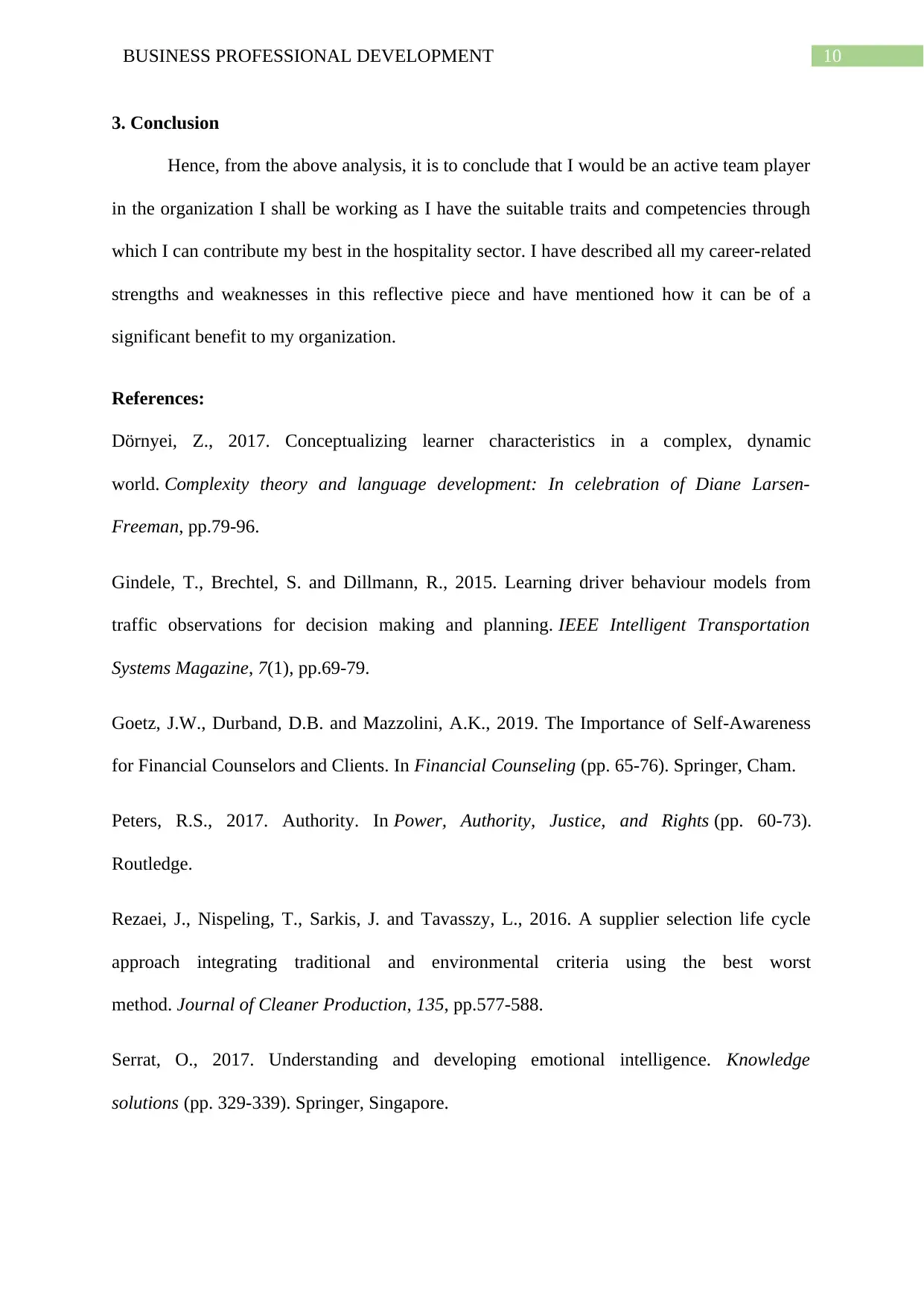
10BUSINESS PROFESSIONAL DEVELOPMENT
3. Conclusion
Hence, from the above analysis, it is to conclude that I would be an active team player
in the organization I shall be working as I have the suitable traits and competencies through
which I can contribute my best in the hospitality sector. I have described all my career-related
strengths and weaknesses in this reflective piece and have mentioned how it can be of a
significant benefit to my organization.
References:
Dörnyei, Z., 2017. Conceptualizing learner characteristics in a complex, dynamic
world. Complexity theory and language development: In celebration of Diane Larsen-
Freeman, pp.79-96.
Gindele, T., Brechtel, S. and Dillmann, R., 2015. Learning driver behaviour models from
traffic observations for decision making and planning. IEEE Intelligent Transportation
Systems Magazine, 7(1), pp.69-79.
Goetz, J.W., Durband, D.B. and Mazzolini, A.K., 2019. The Importance of Self-Awareness
for Financial Counselors and Clients. In Financial Counseling (pp. 65-76). Springer, Cham.
Peters, R.S., 2017. Authority. In Power, Authority, Justice, and Rights (pp. 60-73).
Routledge.
Rezaei, J., Nispeling, T., Sarkis, J. and Tavasszy, L., 2016. A supplier selection life cycle
approach integrating traditional and environmental criteria using the best worst
method. Journal of Cleaner Production, 135, pp.577-588.
Serrat, O., 2017. Understanding and developing emotional intelligence. Knowledge
solutions (pp. 329-339). Springer, Singapore.
3. Conclusion
Hence, from the above analysis, it is to conclude that I would be an active team player
in the organization I shall be working as I have the suitable traits and competencies through
which I can contribute my best in the hospitality sector. I have described all my career-related
strengths and weaknesses in this reflective piece and have mentioned how it can be of a
significant benefit to my organization.
References:
Dörnyei, Z., 2017. Conceptualizing learner characteristics in a complex, dynamic
world. Complexity theory and language development: In celebration of Diane Larsen-
Freeman, pp.79-96.
Gindele, T., Brechtel, S. and Dillmann, R., 2015. Learning driver behaviour models from
traffic observations for decision making and planning. IEEE Intelligent Transportation
Systems Magazine, 7(1), pp.69-79.
Goetz, J.W., Durband, D.B. and Mazzolini, A.K., 2019. The Importance of Self-Awareness
for Financial Counselors and Clients. In Financial Counseling (pp. 65-76). Springer, Cham.
Peters, R.S., 2017. Authority. In Power, Authority, Justice, and Rights (pp. 60-73).
Routledge.
Rezaei, J., Nispeling, T., Sarkis, J. and Tavasszy, L., 2016. A supplier selection life cycle
approach integrating traditional and environmental criteria using the best worst
method. Journal of Cleaner Production, 135, pp.577-588.
Serrat, O., 2017. Understanding and developing emotional intelligence. Knowledge
solutions (pp. 329-339). Springer, Singapore.
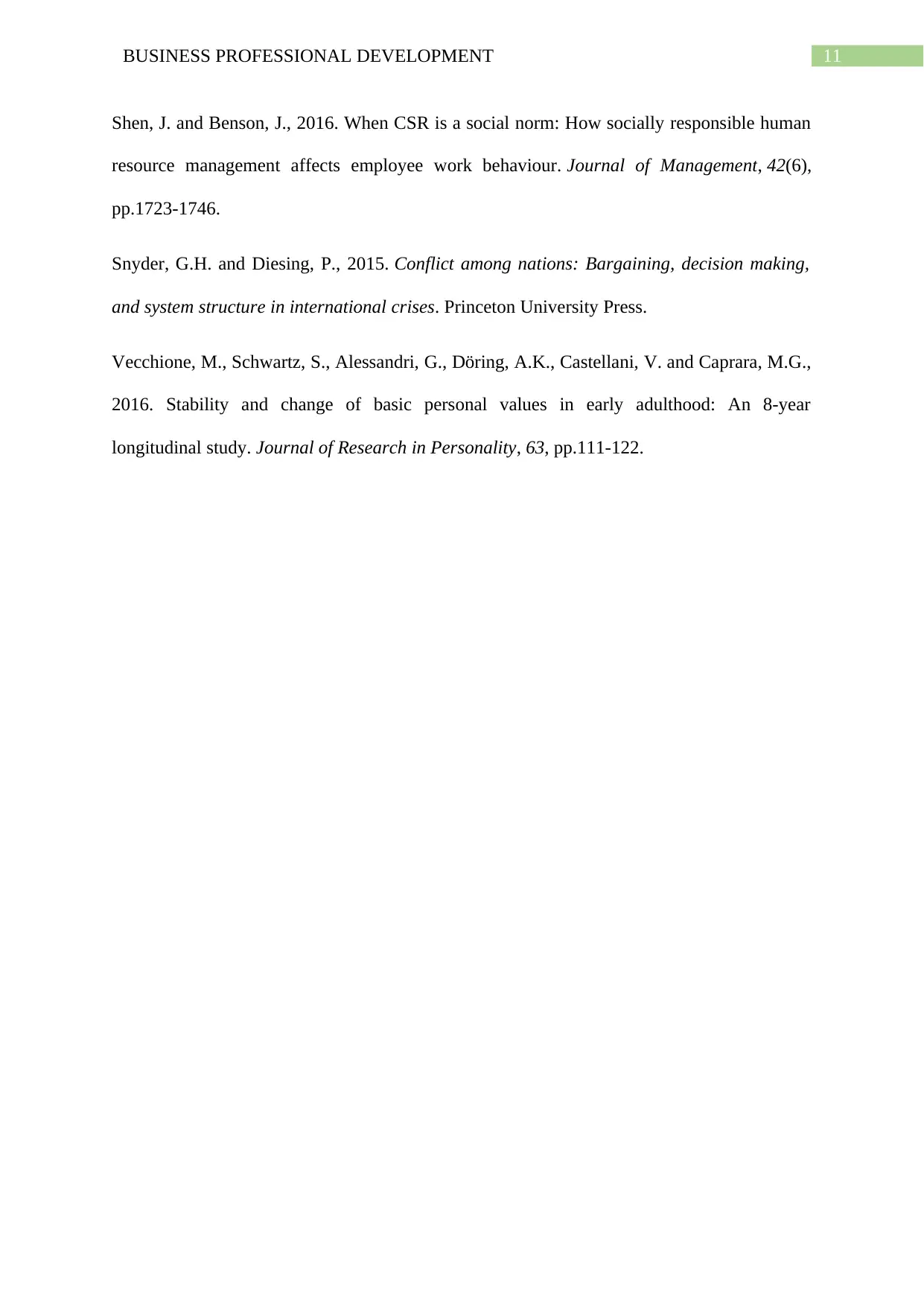
11BUSINESS PROFESSIONAL DEVELOPMENT
Shen, J. and Benson, J., 2016. When CSR is a social norm: How socially responsible human
resource management affects employee work behaviour. Journal of Management, 42(6),
pp.1723-1746.
Snyder, G.H. and Diesing, P., 2015. Conflict among nations: Bargaining, decision making,
and system structure in international crises. Princeton University Press.
Vecchione, M., Schwartz, S., Alessandri, G., Döring, A.K., Castellani, V. and Caprara, M.G.,
2016. Stability and change of basic personal values in early adulthood: An 8-year
longitudinal study. Journal of Research in Personality, 63, pp.111-122.
Shen, J. and Benson, J., 2016. When CSR is a social norm: How socially responsible human
resource management affects employee work behaviour. Journal of Management, 42(6),
pp.1723-1746.
Snyder, G.H. and Diesing, P., 2015. Conflict among nations: Bargaining, decision making,
and system structure in international crises. Princeton University Press.
Vecchione, M., Schwartz, S., Alessandri, G., Döring, A.K., Castellani, V. and Caprara, M.G.,
2016. Stability and change of basic personal values in early adulthood: An 8-year
longitudinal study. Journal of Research in Personality, 63, pp.111-122.
⊘ This is a preview!⊘
Do you want full access?
Subscribe today to unlock all pages.

Trusted by 1+ million students worldwide
1 out of 12
Related Documents
Your All-in-One AI-Powered Toolkit for Academic Success.
+13062052269
info@desklib.com
Available 24*7 on WhatsApp / Email
![[object Object]](/_next/static/media/star-bottom.7253800d.svg)
Unlock your academic potential
Copyright © 2020–2025 A2Z Services. All Rights Reserved. Developed and managed by ZUCOL.





